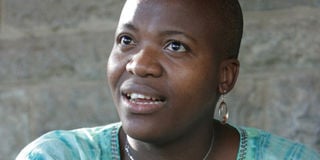WANNER: Revelations in a literary city far from my home

Zukiswa Wanner is a South African journalist and novelist currently living in Nairobi. Photo/FILE
What you need to know:
- The Cat Café, where lonely people come and stroke cats for some time, may deceive you that you are in a rich country but one should not be deceived. This is for the very few.
- The rest of the people probably feel the way we do and chase cats away when we are at our favourite nyama choma joints.
- In fact, in a lot of ways, Lviv is very much a city in a developing world as the Soviet era trams, which run on electricity, show.
My late father studied in Eastern Europe. The father of a character in my current work-in-progress studied in Eastern Europe, so an invitation to Eastern Europe was always going to be welcome.
Until Friday before departure, though, it was all up still in the air. I had not had the three weeks required to apply for a visa in South Africa or Kenya before I left. Would I get it?
Three days before departure after some letters from the Mayor of Lviv and a few phone calls by the organisers to the Ukranian Embassy, I got the visa. And after a 27-hour road trip through Germany and Poland, I finally got to Ukraine for the Lviv Literary Festival.
The Cat Café, where lonely people come and stroke cats for some time, may deceive you that you are in a rich country but one should not be deceived. This is for the very few.
The rest of the people probably feel the way we do and chase cats away when we are at our favourite nyama choma joints. In fact, in a lot of ways, Lviv is very much a city in a developing world as the Soviet era trams, which run on electricity, show.
Having had reports from Dude that power has been on and off in my hood in South B, I could not help asking my guide Irina just exactly what happens when someone is on a tram and power goes off. She looked at me as though it were something that did not happen often but then responded, “we get off and walk.” Did they get a refund for their fare? I wanted to know. “No,” she answered.
But after getting on a tram and realising how little it cost, I concluded it would probably have cost more to do the paperwork for the refund than to just leave the refund.
They also have an abundance of marshtrukas everywhere which are much like our matatus and yellow in colour except they do not have the loud music but they do have standing passengers. Ukraine has not yet had a John Michuki in the transport ministry.
But then I would stand on marshtrukas any day if I could import the literary culture of Lviv to any of the African countries I call home. The largest university in Lviv is named after a writer, Ivan Franko. As is the theatre. And there is a statue, too, of the man who gave the world the psychiatry word which is now in use in common lexicon in the English language — masochist. The writer and journalist, Loepold von Sacher-Masoch.
GLORIFICATION OF LITERATURE
And when I looked at all this glorification of literature, I could not help being saddened that in South Africa, the late writer Sol Plaatje is known more for having been a founding member of the governing African National Congress than for his writing. Or that in Kenya, the only place I could remember named after a writer is a pub and a kiosk in Nairobi West, both named Whispers. Or that in Zambia and Zimbabwe, everything is named after politicians.
And just in case any reader assumes this respect for literature is something that got buried in the past, I have to mention that there is still so much respect for words that all the events I took part in were packed, and it was not the elite as there are few elites in this town in Eastern Europe. The publishing company that won the best award last year for a translation — worldwide — was exhibiting at the festival.
On Saturday evening from ten at night, I attended a music and poetry recital event at a venue the size of the floor of Kenyatta International Convention Centre. The place was packed with youngsters in their late teens and in their 20s. With high internet connectivity rate in Lviv, it became clear to me that the excuse of Facebook and Twitter being a distraction from literature just did not hold true.
I left at 1am as I had an event in the morning but my friend and poet, the stateless Aleni Agami formerly of Uganda, told me that the house was packed until the last event at 6am.
At that point I asked myself how many alleged lovers of literature in Nairobi were aware and would attend the Nairobi Book Fair ending tomorrow.
The answer I gave myself was not favourable but I hope I am wrong. And if I am right, maybe it is time that the publishers, the writers, the booksellers and all relevant stakeholders start asking themselves how to do things differently.
Zukiswa Wanner is a South African author based in Kenya. [email protected]





